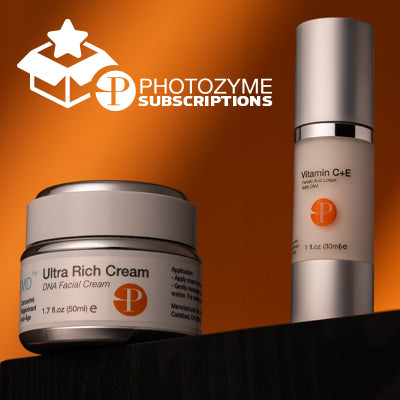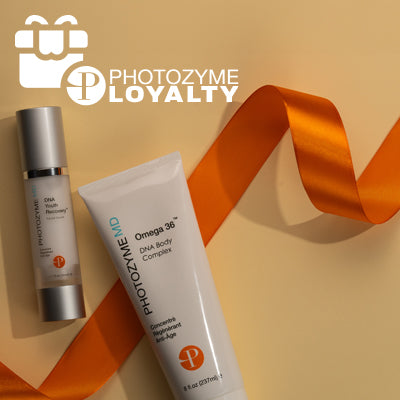
Here's the difference between retinal vs retinol and find the perfect one for youthful, radiant skin with Photozyme’s innovative skincare products!
Key Takeaways:
- Understanding the Difference: Retinal and retinol are both derivatives of Vitamin A, crucial for anti-aging and skin rejuvenation, but differ in potency and speed of action.
- Who Should Use Retinol vs. Retinal: Retinol is best suited for those starting their anti-aging journey or with sensitive skin, while retinal offers faster results for more experienced retinoid users.
- How To Transition Effectively: Transitioning from retinol to retinal requires patience and gradual integration into your skincare routine to avoid irritation and maximize benefits.
Photozyme leads the way in advanced skincare by combining science-backed innovation with dermatologist-trusted formulations. Our proprietary DNA repair enzyme technology targets aging at the source, delivering visible improvements in skin appearance. With every product, we help customers pursue healthier, more radiant-looking skin.
Many share the goal of achieving youthful, radiant skin in skincare. With countless products clamoring for attention, it's vital to understand the ingredients at play. Retinoids, particularly retinal and retinol, are frequently discussed due to their transformative benefits. But what exactly are these ingredients, and how do they shape the skincare journey?
In this article, we will explore the key differences between retinal and retinol, how each works on your skin, who they’re best suited for, and how to choose the right one to support your anti-aging skincare goals effectively.
Retinol vs Retinal: Understanding The Differences
When discussing skincare and anti-aging, understanding the distinctions between retinol and retinal is key. Both are forms of Vitamin A, a powerhouse ingredient widely recognized for its rejuvenating benefits. However, they differ in their chemical structure and how they interact with the skin.
Retinol
Retinol is a widely used skincare ingredient and a derivative of Vitamin A. It's popular for its ability to promote cell turnover, resulting in smoother and more youthful skin. Retinol works gradually and is suitable for long-term use. Its effectiveness in reducing fine lines, wrinkles, and uneven skin texture makes it a favorite among those pursuing a comprehensive anti-aging regimen.
Retinal
On the other hand, retinal, which stands for retinaldehyde, is known for being more potent and faster-acting than retinol. It converts to retinoic acid more rapidly, delivering benefits in less time. This form is excellent for individuals with retinoid experience who desire more advanced, visible results without the irritation often associated with retinoic acid.
Never run out of your skincare must-haves—subscribe to Photozyme’s Retinol Subscription and keep your routine consistent and results-driven. Enjoy the convenience of regular deliveries, exclusive savings, and access to science-backed formulations designed to reduce wrinkles and restore radiance. Subscribe today!
Benefits Of Retinol For Your Skin
Retinol is renowned in skincare for its transformative effects on the skin. As a derivative of Vitamin A, it serves multiple functions that cater to various skin concerns, making it a staple in many anti-aging and rejuvenating skincare routines.
Here's why incorporating retinol might be a game-changer for your skin:
Reduces Fine Lines And Wrinkles
Retinol stimulates collagen production, a critical protein that keeps your skin firm and smooth. This increased collagen production helps diminish the appearance of fine lines and wrinkles over time, promoting a more youthful complexion. At Photozyme, we leverage retinol's benefits in products like our DNA Youth Recovery Facial Serum to effectively target these common signs of aging.
Improves Skin Texture
By encouraging faster cell turnover, retinol can help shed the outer layer of dead skin cells, revealing the fresher, newer skin beneath. This process smooths out uneven skin texture, giving your skin a refined and polished appearance.
Fades Dark Spots And Hyperpigmentation
Retinol helps to fade dark spots, hyperpigmentation, and sun damage by promoting skin cell renewal. This leads to a more even skin tone and a brighter complexion, enhancing your skin's natural radiance.
Unclogs Pores
As a powerful exfoliant, retinol helps to prevent acne breakouts by keeping your pores clear. It exfoliates trapped dead skin cells and excess oil, reducing the likelihood of clogged pores and associated blemishes.
Enhances Product Absorption
Regular use of retinol preps your skin to better absorb other beneficial ingredients from your skincare routine. This allows you to maximize the efficacy of subsequent products, ensuring you get the most out of your regimen.
Retinol’s proven track record makes it a highly effective ingredient, especially in anti-aging solutions. As part of Photozyme’s commitment to innovation, we incorporate retinol in our formulations to ensure our customers can achieve visibly smoother, more radiant skin.
Benefits Of Retinal For Your Skin
Retinal, or retinaldehyde, stands out as a potent ingredient in the arsenal against aging skin. It offers remarkable benefits that you might find transformative. Let's see why incorporating retinal into your skincare routine could be a worthwhile investment for your skin health.
Enhanced Efficacy
Retinal is known for its enhanced efficacy compared to other retinoids. It works faster than retinol, requiring only one conversion to retinoic acid, the active form, ensuring that you see visible results in a shorter time frame.
Minimizes Fine Lines And Wrinkles
The regenerative properties of retinal make it highly effective in stimulating collagen production, which in turn helps reduce the appearance of fine lines and wrinkles. By regularly using products containing retinal, you can achieve smoother and firmer skin over time.
Improves Skin Texture And Tone
Beyond tackling wrinkles, retinal also plays a vital role in evening out skin texture and tone. It accelerates cell turnover, which helps fade pigmentation and dark spots, leading to a more uniform complexion.
Reduces Acne
Retinal can also be a beneficial ally in the fight against acne. Its oil-regulating properties help prevent clogged pores and reduce inflammation, effectively diminishing the frequency and severity of acne breakouts.
Suitable For Sensitive Skin
While many potent skincare ingredients can be harsh on sensitive skin, retinal is often better tolerated. Its gentle nature allows you to enjoy its powerful benefits without the irritation that stronger treatments might cause.
By incorporating retinal products into your daily regimen, you can harness the full potential of retinal to achieve a youthful, healthy glow. At Photozyme, we are committed to providing solutions that cater to all your skincare needs with innovative and proprietary ingredients designed to transform your skin.
Retinol vs. Retinal: Which One Should You Choose?
Choosing between retinol and retinal depends on your skin’s needs, sensitivity, and experience with active ingredients. Both are powerful forms of Vitamin A known for their anti-aging and skin-renewing properties, but they differ in strength, speed, and tolerance.
Retinol
Retinol is ideal for those just beginning their anti-aging journey or looking to improve mild to moderate signs of aging, such as fine lines, uneven skin tone, and dullness. It's gentler on the skin and allows for a gradual build-up, making it perfect for retinoid beginners or those with sensitive skin. At Photozyme, we recommend starting with retinol-based products if you're new to actives and always encourage patch testing to assess tolerance.
Retinal
On the other hand, retinal (also known as retinaldehyde) is a step up in potency. It’s more effective and acts faster than retinol, making it suitable for individuals already familiar with retinoids and wanting more dramatic results—such as improvement in deep wrinkles, acne, or uneven texture—without compromising skin health. Retinal is a smart choice for seasoned users looking to upgrade their routine thanks to its high efficacy and lower irritation potential.
At Photozyme, our science-backed formulations are designed to support your skin through either option, offering targeted, effective results with ingredients that prioritize performance and comfort.
How To Incorporate Retinoids Into Your Skincare Routine
Incorporating retinoids such as retinal or retinol can significantly benefit your skincare regimen and maintain youthful, vibrant skin. However, proper introduction and usage are crucial to optimize their effects and minimize potential irritation.
- Start Gradually: Begin using retinoids like retinol no more than two or three times a week. This allows your skin to build tolerance and adjust to these powerful ingredients. As your skin adapts, you can gradually increase the frequency of application.
- Nighttime Application: Retinoids are best applied at night as they increase your skin’s sensitivity to sunlight. After cleansing with a product such as Photozyme's Probiotic P291 Cleanser, gently apply a pea-sized amount of retinoid to your face. The nighttime application ensures benefits while reducing the risk of sunlight-related irritation.
- Moisturize Thoroughly: Many people experience dryness when starting retinoids. It’s vital to keep your skin well-hydrated. Apply a rich moisturizer afterward, like our Ultra Rich DNA Facial Cream, to lock in moisture and enhance the calming effect on your skin, counterbalancing any dryness.
- Sun Protection: Always wear sunscreen during the day, even using retinoids at night. Products like our BEYONDbloc offer enhanced protection from UV rays that can otherwise damage or irritate sensitized skin.
- Be Patient: Significant results from retinoids can take weeks to months, but consistent application leads to considerable improvements in skin texture and reduction in visible signs of aging over time.
Incorporating retinoids doesn't need to be daunting. With patience and the right approach, products containing ingredients like retinal and retinol can become powerful allies on your journey to smoother, brighter skin.
Final Thoughts
Understanding the differences between retinal and retinol is crucial to making an informed decision for your skincare regimen. These ingredients have shown significant benefits in addressing aging concerns, yet they cater to distinct needs. Retinol has been a staple for decades, renowned for its ability to smooth fine lines and improve skin texture over time. Retinal, on the other hand, offers faster results with less irritation due to its closer proximity in the metabolic conversion to retinoic acid.
At Photozyme, we are committed to providing innovative solutions that cater to your skin's unique needs. Whether you need the gentle approach of retinol or the potent effects of retinal, our range of skincare products utilizes cutting-edge science to deliver visible results.
Ultimately, the choice between retinal and retinol depends on your skin type, sensitivity, and specific concerns. By integrating high-quality ingredients and formulas, we ensure that whatever you choose, you're investing in a brighter, more youthful complexion.
Read also:
- Retinol Or Moisturizer First? The Quick Guide To Layering Your Skincare Products
- What Not To Use With Retinol: Ingredients To Avoid For Maximum Effectiveness
- How Often To Use Retinol: Finding The Right Frequency For Your Skincare Routine
Frequently Asked Questions About Retinal vs Retinol
What is retinal, and how does it differ from retinol?
Retinal, also known as retinaldehyde, and retinol are both derivatives of vitamin A that play essential roles in skincare, particularly in anti-aging. The major difference lies in their conversion rate to retinoic acid, with retinal being more potent as it requires one less conversion step than retinol, leading to faster results.
Can retinal work faster than retinol?
Yes, retinal can work faster than retinol due to its quicker conversion rate to retinoic acid. This means it can deliver more immediate improvements in skin texture, fine lines, and overall tone.
Why is retinol more commonly known than retinal?
Retinol has been widely researched and utilized in skincare products for a longer period, making it more recognized among consumers. It is often considered the gold standard for over-the-counter anti-aging treatments, contributing to its popularity over the lesser-known but effective retinal.
Is retinal better for sensitive skin compared to retinol?
Retinal can be better tolerated by sensitive skin since it is less irritating due to its efficient conversion to retinoic acid. However, individual skin types can react differently, so it's essential to introduce retinal into your routine gradually.
How do retinal and retinol impact the signs of aging?
Both retinal and retinol effectively reduce visible signs of aging by promoting collagen production, accelerating cell turnover, and refining skin texture. Over time, they can diminish the appearance of fine lines, wrinkles, and sun damage.
What are the side effects of using retinal on the skin?
Common side effects of using retinal include mild redness, peeling, or dryness, particularly as your skin adapts to the treatment. These effects are temporary as long as you follow a controlled application routine.
Can both retinal and retinol cause skin irritation?
Yes, both compounds can cause skin irritation, especially during the initial phase of use. However, retinal is often less irritating than retinol due to its quicker conversion process. It is crucial to moisturize adequately and adjust usage frequency based on your skin's response.
Is it safe to use retinal or retinol every day?
While retinal and retinol can be highly effective, daily use should be cautiously approached, especially if you are new to retinoids. Initially, start with a few times per week and gradually increase frequency as your skin builds tolerance, always monitoring for adverse reactions.




